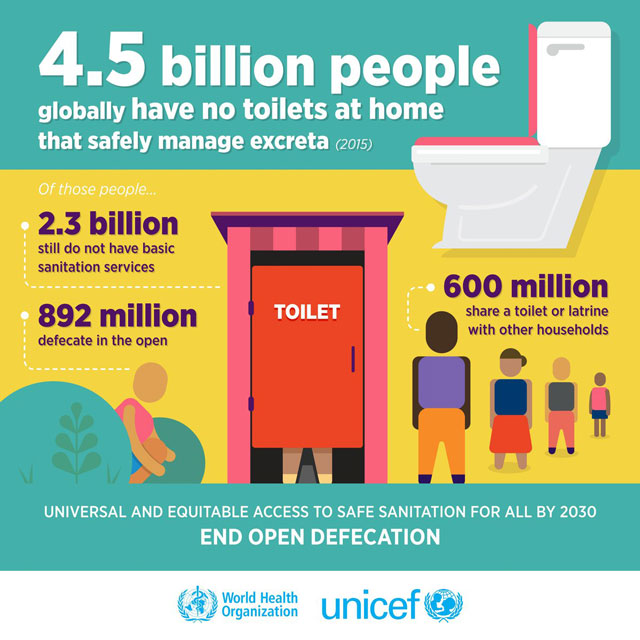
Modi hails toilet ‘milestone’ as India marks Gandhi’s 150th
Ahmedabad, India | AFP | Indian Prime Minister Narendra Modi on Wednesday declared the country of 1.3 billion people free of open defecation, and turned his sights towards eradicating single-use plastic next.
Modi — whose claim has been challenged by experts — made his ambitious “latrines for all” pledge when he first took office in 2014 and his announcement late Wednesday coincided with the 150th birthday of Mahatma Gandhi, an icon not just for Indian independence but also sanitation.
“In 60 months, 600 million people have been given access to toilets, more than 110 million toilets have been built,” Modi said in a speech to 20,000 village chiefs in western Ahmedabad city in his and Gandhi’s home state of Gujarat.
“The women of our country no longer have to wait for darkness to descend. Innocent lives of young children are being saved… the expense on healthcare has come down,” Modi added, calling the achievement a significant milestone for the vast developing country.
However, despite huge progress, experts have expressed scepticism about his bold claim, saying millions still lack access to a toilet, and that because of old habits many of the new facilities that have been built are not being used.
Modi acknowledged that challenges remained, saying “we have to continue the journey to make India clean. We have to make this change in behaviour permanent”.
“We have to make sure that the toilets are used for the purpose for which they have been built. People who are still left out must be connected to (them).”

– Plastic free ambitions-
Modi, who stormed to a second term in office in May, also pledged to embark on another major project — to eradicate the country of single-use plastic.
“Plastic is a big danger to health, environment and cleanliness. We must achieve the target of making India plastic free by 2022,” he said, reiterating a recent promise.
While some states have already banned the use of such plastics, enforcement of the rules has been lax.
“I know that the use of plastic bags has already come down. Millions of households have taken a decision not to use single-use plastics,” he said.
“This will benefit the environment. Roads and sewers won’t get blocked. Cattle and marine life would be saved.”
– Toilet claim doubts –
Modi’s claim that India is ‘open-defecation free’ has been questioned by experts, who cite data from rural as well as urban areas.
“Latrine ownership increased from about 35 percent to about 70 percent… That did accelerate the reduction of open defecation,” said Sangita Vyas from the Research Institute for Compassionate Economics (RICE).
“But in December 2018 we estimated about half of people in the states of Bihar, Madhya Pradesh, Uttar Pradesh and Rajasthan still defecated in the open,” she told AFP.
She doubts the shortfall has been made up since. Those four states are home to more than 450 million people.
For instance across from Modi’s office, on the other side of New Delhi, Vijaya relieved herself next to the tracks near Hazrat Nizamuddin railway station early in the morning.
“There is no toilet (where we live). We all go out in the open,” she told AFP.
“We have been here for years and nobody has constructed a toilet, despite our repeated pleas,” Kaveri, a domestic helper, said in her nearby home in the poor neighbourhood of Barapullah.
“We go out in the public and it’s not safe, but what do we do?” said the mother-of-three.
Many of the toilets that have been constructed are often locked, used for storage, or some other purpose.
Cultural barriers, engrained habits or a lack of knowledge about sanitation also create barriers to more widespread usage.
“If you’re going to change the behaviour of rural folk on a sustainable, long term, permanent basis, the only way you’re going to be able to do it would be by first focusing on behaviour change,” Santosh Mehrotra, a development economist at Jawaharlal Nehru University, told AFP.
 The Independent Uganda: You get the Truth we Pay the Price
The Independent Uganda: You get the Truth we Pay the Price

 Who
Who

